The sight of hawks gracefully soaring through the skies can be captivating and awe-inspiring. However, when these magnificent birds start appearing near your house regularly, it may raise questions and spark curiosity.
Rest assured, the presence of hawks around your property is not necessarily cause for alarm. In fact, it signifies a healthy ecosystem and highlights the fascinating interplay between wildlife and human habitats.
This article aims to shed light on why are hawks hanging around my house and explore the benefits they bring to your local environment.
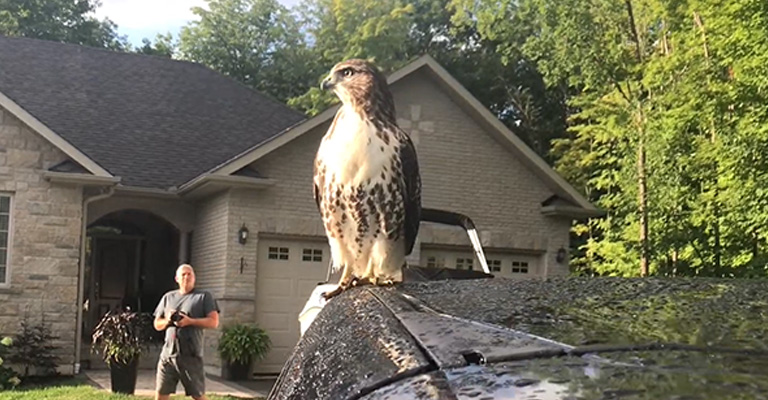
Why Are Hawks Hanging Around My House?
If you’re wondering why you see hawks around your house, here are the reasons:
Abundance of Prey
Hawks, as raptors, primarily hunt for small mammals, birds, and reptiles. If you find hawks lingering near your house, it could be an indication of an abundant food source in your area.
Mice, voles, rabbits, squirrels, or even smaller bird species might be present in your vicinity, making it an attractive hunting ground for these birds of prey.
Suitable Habitat
Hawks require suitable habitats that offer an ideal combination of open spaces for hunting and nearby perching spots for resting and nesting. Your property might provide favorable conditions such as tall trees, open fields, or nearby water sources, making it an appealing location for hawks to establish their territory.
Ecological Balance
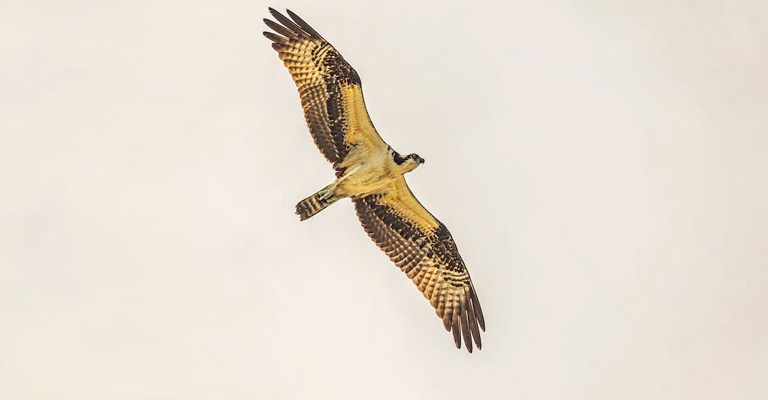
The presence of hawks near your house is a testament to a healthy and balanced ecosystem. Hawks play a vital role in regulating populations of rodents and smaller bird species.
By preying on these animals, hawks help maintain a natural equilibrium, preventing population explosions and the associated ecological imbalances.
Protection from Predators
Hawks possess exceptional vision and maneuverability, which allows them to quickly spot and evade potential threats. By perching near your house, hawks may be taking advantage of an elevated vantage point that offers them protection from ground-based predators.
Urban Adaptation
Hawks have demonstrated remarkable adaptability to urban environments. As human settlements expand, hawks have learned to utilize the resources available in urban and suburban areas.
They can thrive near human dwellings, taking advantage of the diverse range of prey, open spaces, and sheltered perching spots provided by buildings and trees.
Wildlife Gardening
If you actively participate in wildlife-friendly gardening practices, such as planting native trees and shrubs, providing bird feeders, or maintaining a small pond, your property becomes an oasis for various wildlife, including hawks.
Safe Ways of Keeping Hawks Away from Your House
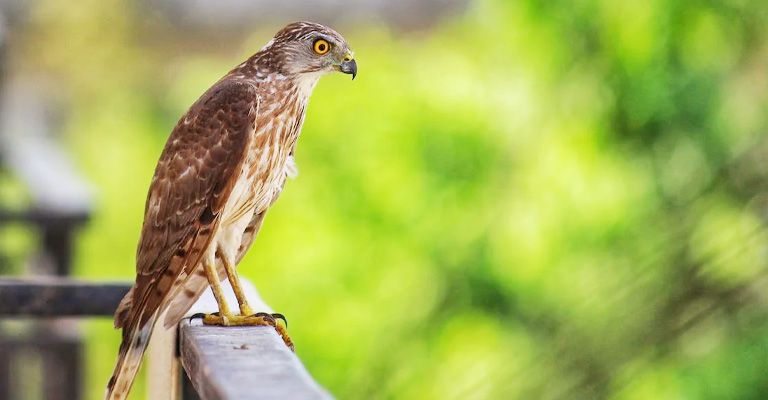
If you find that the presence of hawks around your house is causing concerns or conflicts, there are several safe and humane methods to discourage them from frequenting your property. Here are some suggestions:
Reflective Objects
Hawks are wary of bright, reflective surfaces. Hang shiny objects, such as old CDs, aluminum foil strips, or reflective tape, near windows or areas where hawks tend to perch. The light reflections can deter them from approaching too closely.
Scarecrow Effigies
Create scarecrow-like effigies in open areas, resembling human figures with outstretched arms. The presence of these structures can make hawks uncomfortable and discourage them from landing or perching nearby.
Distraction Techniques
Install bird feeders and birdbaths away from areas where you don’t want hawks to visit. This can attract smaller birds, which hawks may perceive as competition, and deter them from sticking around.
Noise and Movement
Hawks are sensitive to sudden movements and loud noises. Utilize motion-activated devices that emit sounds or produce sudden movements when triggered by hawk activity. This can startle and discourage them from returning.
Physical Barriers
If hawks are targeting specific areas, such as a fish pond or chicken coop, consider installing netting or wire mesh to create a physical barrier. Ensure that the mesh is small enough to prevent the hawk from entering but still allows airflow and visibility.
Secure Enclosures
If you have small pets, ensure they are supervised or kept in secure enclosures while outside. Hawks are less likely to be attracted to your property if they don’t perceive it as an easy hunting ground.
Consult with Experts
If you’re facing persistent hawk-related issues, it may be beneficial to seek guidance from local wildlife authorities or bird control professionals. They can provide specific advice tailored to your situation and offer additional strategies to deter hawks safely.
Remember, it is essential to approach hawk deterrent methods with care and respect for wildlife. The goal is to encourage hawks to find suitable hunting grounds elsewhere while maintaining a healthy ecosystem.
Is Seeing Hawks Around My Home A Good Omen?
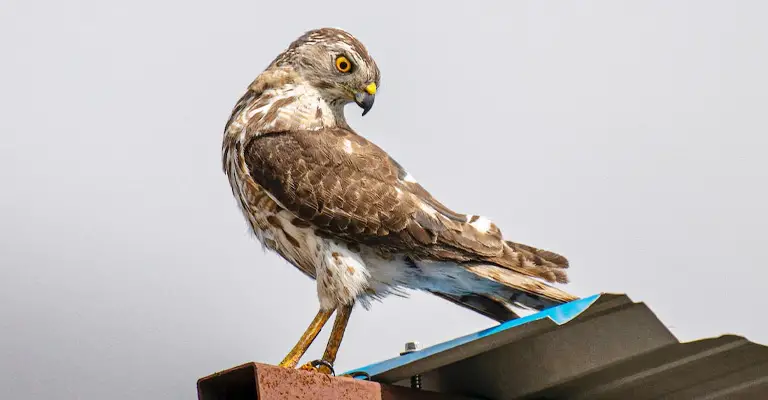
The belief that seeing hawks around your home is a good omen varies across cultures and personal beliefs. In many cultures, hawks are associated with positive attributes and symbolize power, focus, and keen observation.
However, whether seeing hawks around your home is considered a good omen ultimately depends on your personal interpretation and cultural background.
For some, the presence of hawks can be seen as a sign of heightened awareness, clarity of vision, and the ability to see the bigger picture. It may be interpreted as a message to stay focused on your goals, harness your inner strength, and take decisive action.
Hawks are often seen as spiritual messengers, and their appearance might be viewed as a reminder to stay connected to your intuition and trust your instincts.
In Native American cultures, hawks are often regarded as powerful spirit animals representing wisdom, foresight, and protection. Spotting a hawk can be seen as a positive sign that you are being watched over and guided by higher forces.
It’s important to note that interpretations of omens and signs can vary widely, and individual beliefs and cultural perspectives play a significant role. Some people may assign personal meaning to the appearance of hawks based on their own experiences and associations.
Ultimately, whether seeing hawks around your home is considered a good omen or not is a subjective matter. If you feel a positive connection or find solace in their presence, you can choose to embrace it as a symbolic reminder or inspiration.
However, it’s always important to appreciate hawks and other wildlife from a respectful distance, allowing them to thrive in their natural habitat without interference.
Can I Kill Hawks For Hanging Around My House?
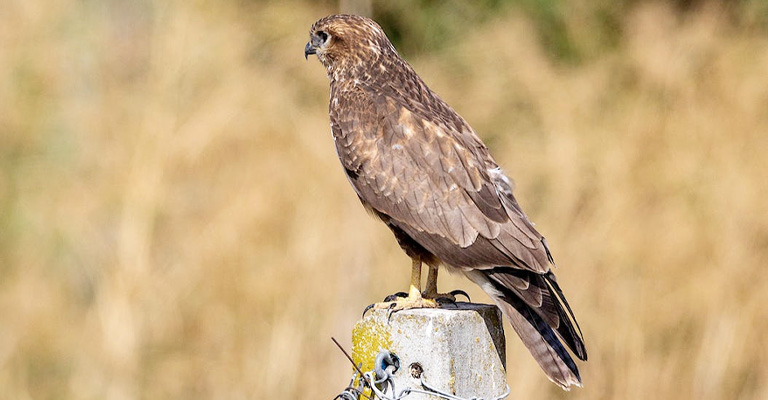
No, it is illegal and highly unethical to kill hawks or any other protected bird species for hanging around your house. In many countries, including the United States, hawks are protected by laws and regulations, such as the Migratory Bird Treaty Act (MBTA).
These laws prohibit the hunting, capturing, or harming of hawks and other migratory birds without proper permits. Hawks play a vital role in the ecosystem by controlling populations of rodents and smaller bird species.
They help maintain a natural balance and prevent the over population of certain species. Removing hawks from the environment can lead to imbalances and unintended consequences, such as increased pest populations.
If you are experiencing concerns or conflicts with hawks around your house, it is recommended to explore safe and humane methods to deter them or seek guidance from local wildlife authorities or bird control professionals.
They can provide advice and strategies to address the situation without resorting to harm or killing. It is crucial to respect and coexist with wildlife, recognizing their importance in maintaining healthy ecosystems.
How Long Do Hawks Stay In One Area?
The length of time hawks stay in one area can vary depending on several factors, including food availability, breeding habits, and environmental conditions. Here are a few considerations:
Seasonal Migration
Some hawk species are migratory, meaning they travel long distances between their breeding grounds and wintering areas.
They may spend a few months in a particular region during the breeding season before moving on to other locations. The duration of their stay can range from a few weeks to several months.
Breeding and Nesting
Hawks often establish territories for breeding and raising their young. Once they have selected a suitable nesting site, they typically remain in the vicinity for the duration of the breeding season.
This period can last several months, including the time required for incubation, hatching, and fledging of the young.
Food Availability
Hawks are opportunistic hunters and will stay in an area as long as there is an adequate food supply. If a particular area provides a consistent abundance of prey, they may remain there for an extended period. However, if the prey population diminishes, they may move on to other locations in search of better hunting opportunities.
Environmental Factors
Environmental conditions, such as changes in weather patterns, can influence the duration of a hawk’s stay in an area. Extreme weather events, food scarcity, or disturbances to their habitat may prompt hawks to relocate to more favorable environments.
FAQs
Hawks generally pose no threat to humans. They prefer to hunt small mammals and birds rather than confront people. However, it’s important to keep an eye on small pets, especially if they are left unattended outside.
To attract hawks to your property, you can create a wildlife-friendly environment. Planting native trees and shrubs, providing bird feeders, and maintaining a small pond can attract a variety of wildlife, including hawks.
If you encounter an injured or distressed hawk near your house, it’s best to contact your local wildlife rehabilitator or animal control agency. These professionals have the necessary knowledge and expertise to handle and care for injured birds of prey.
It is generally recommended not to feed hawks directly. These birds are skilled hunters and rely on their natural instincts to find food. Feeding them can disrupt their hunting behaviors and potentially lead to dependency on human-provided food sources.
In many countries, including the United States, hawks are protected by laws and regulations. The Migratory Bird Treaty Act (MBTA) in the U.S. prohibits the hunting, capturing, or harming of hawks and other migratory birds without proper permits.
Bottom Line
That was all about why are hawks hanging around my house. Rather than being a cause for concern, the presence of hawks near your house should be celebrated as a sign of a vibrant and well-balanced ecosystem.
These magnificent birds of prey contribute to the control of pest populations, bringing harmony to the natural world. By respecting their presence and ensuring their habitat remains intact, you can enjoy the privilege of witnessing the wonders of nature up close.
So, embrace the sight of hawks hanging around your house, as they serve as a reminder of the intricate relationship between humans and the wildlife that surrounds us.